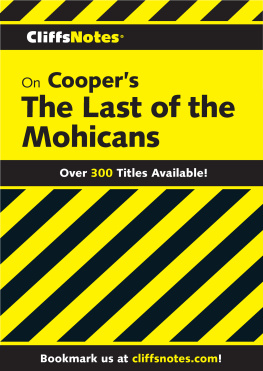Dougald B MacEachen - Cliffsnotes on Byrons Don Juan
Here you can read online Dougald B MacEachen - Cliffsnotes on Byrons Don Juan full text of the book (entire story) in english for free. Download pdf and epub, get meaning, cover and reviews about this ebook. year: 1970, publisher: HMH Books, genre: Non-fiction. Description of the work, (preface) as well as reviews are available. Best literature library LitArk.com created for fans of good reading and offers a wide selection of genres:
Romance novel
Science fiction
Adventure
Detective
Science
History
Home and family
Prose
Art
Politics
Computer
Non-fiction
Religion
Business
Children
Humor
Choose a favorite category and find really read worthwhile books. Enjoy immersion in the world of imagination, feel the emotions of the characters or learn something new for yourself, make an fascinating discovery.
- Book:Cliffsnotes on Byrons Don Juan
- Author:
- Publisher:HMH Books
- Genre:
- Year:1970
- Rating:5 / 5
- Favourites:Add to favourites
- Your mark:
- 100
- 1
- 2
- 3
- 4
- 5
Cliffsnotes on Byrons Don Juan: summary, description and annotation
We offer to read an annotation, description, summary or preface (depends on what the author of the book "Cliffsnotes on Byrons Don Juan" wrote himself). If you haven't found the necessary information about the book — write in the comments, we will try to find it.
This CliffsNotes guide includes everything youve come to expect from the trusted experts at CliffsNotes, including analysis of the most widely read literary works.
Cliffsnotes on Byrons Don Juan — read online for free the complete book (whole text) full work
Below is the text of the book, divided by pages. System saving the place of the last page read, allows you to conveniently read the book "Cliffsnotes on Byrons Don Juan" online for free, without having to search again every time where you left off. Put a bookmark, and you can go to the page where you finished reading at any time.
Font size:
Interval:
Bookmark:
Copyright 1970 Houghton Mifflin Harcourt Publishing Company
All rights reserved.
www.hmhco.com
cliffsnotes.com
For information about permission to reproduce selections from this book, write to or to Permissions, Houghton Mifflin Harcourt Publishing Company, 3 Park Avenue, 19th Floor, New York, New York 10016.
The publisher and the author make no representations or warranties with respect to the accuracy or completeness of the contents of this work and specifically disclaim all warranties, including without limitation warranties of fitness for a particular purpose. No warranty may be created or extended by sales or promotional materials. The advice and strategies contained herein may not be suitable for every situation. This work is sold with the understanding that the publisher is not engaged in rendering legal, accounting, or other professional services. If professional assistance is required, the services of a competent professional person should be sought. Neither the publisher nor the author shall be liable for damages arising herefrom. The fact that an organization or website is referred to in this work as a citation and/or a potential source of further information does not mean that the author or the publisher endorses the information the organization or website may provide or recommendations it may make. Further, readers should be aware that Internet websites listed in this work may have changed or disappeared between when this work was written and when it is read.
Trademarks: CliffsNotes, the CliffsNotes logo, Cliffs, cliffsnotes.com, and all related trademarks, logos, and trade dress are trademarks or registered trademarks of Houghton Mifflin Harcourt Publishing Company. All other trademarks are the property of their respective owners. Houghton Mifflin Harcourt is not associated with any product or vendor mentioned in this book.
eISBN 978-0-544-18127-4
v1.0816
Don Juan was born in Seville, Spain, the son of Don Jos, a member of the nobility, and Donna Inez, a woman of considerable learning. Juans parents did not get along well with each other because Don Jos was interested in women rather than in knowledge and was unfaithful to Donna Inez. Donna Inez was on the point of suing her husband for divorce when he died of a fever. The education of Juan became the primary interest of his mother. She saw to it that he received a thorough training in the arts and sciences but took great care that he should learn nothing about the basic facts of life.
Among Donna Inezs friends is Donna Julia, the young and beautiful wife of Don Alfonso, a middle-aged man incapable of engaging her affections. When Juan is sixteen, Donna Julia falls in love with the handsome young man and finds opportunities to be in his company. One midsummer evening the two declare their love for each other. In November of that year Don Alfonso comes one night to the bedroom of his wife accompanied by a crowd of his friends. When he enters the room, his wife and her maid are ready for him; the bedclothes have been piled up in a heap on the bed. Don Alfonso and his followers search Donna Julias suite for a lover but find none. While searching, Don Alfonso becomes the target of a tirade of abuse from his wife. The whole company leaves, crestfallen. Don Alfsonso soon returns to apologize and happens to find a pair of mens shoes in his wifes bedroom. He leaves the room to get his sword. Don Juan, who has been hidden under the heap of bedclothes, prepares to make his escape by a back exit and runs into Don Alfsonso. In the fight that ensues, Juan strikes Alfonso on the nose and makes his escape.
The sequel to these events is that Donna Julia is sent to a convent and Don Alfonso sues for divorce. Donna Inez decides that her son should spend the next four years traveling.
Don Juan embarks on a ship bound for Leghorn, Italy, where his family has relatives. Not long after the ship leaves port, a violent storm drives it off its course. In spite of everything the crew can do, the ship finally goes down with most of its passengers. Only as many as can fit in a small cutter and a longboat are saved. Then the cutter is swamped and the nine men in it drown. The men in the longboat, including Juan and his tutor, are reduced to eating shoe leather. At this point one of the survivors suggests cannibalism as a means of survival. The lot falls on Juans tutor. The arrival of the boat at an island prevents the sacrifice of a second victim. The boat is driven against a reef and overturns. By this time only Juan and three others are left alive. By clinging to an oar Juan is swept to the shore and manages to crawl up on the beach, where he promptly collapses. The three others perish.
When Juan at last opens his eyes, he sees a lovely young face peering into his. It is Haide, the only daughter of a Greek freebooter who has made the isolated Aegean island his headquarters. Haide and her maid help the weak and emaciated Juan to a cave, where they gradually nurse him back to health. Haide does not dare bring Juan into her home, for she knows that her father would sell him as a slave. Inevitably Juan and Haide fall in love and marry without benefit of clergy. A month after Juans arrival, Lambro, Haides father, takes his fleet on a piratical expedition. Sometime later word is brought back that Lambro has died. Juan and Haide move into his mansion as man and wife. But the rumor of Lambros death is false. When he returns to his island port and walks toward his house, he is surprised to see people idling, feasting, and entertaining themselves. He does not make his presence known immediately. At the time of his arrival, Juan and Haide, attired in gorgeous costumes, are feasting in Lambros dining hall and being entertained by a minstrel.
After dining, Juan and Haide take their siesta. Haide, for the first time, has an ominous nightmare. She dreams that she is in a cave and that Juan lies at her feet, wet and cold and lifeless. While she is gazing on his face, his features slowly change into those of her stern father. She awakes and there before her stands the supposedly dead Lambro. When she arises and shrieks, she awakes Juan. Clinging to him, she tells him that the intruder is her father and beseeches him to beg his forgiveness. She pleads with her father to spare Juan. Lambro quietly commands Juan to surrender the saber he has snatched from the wall. When Juan refuses, Haides father draws and cocks his pistol. Haide saves Juans life by throwing herself in front of him. Her father replaces his pistol in its holster and blows a whistle. At once twenty of his followers appear and attack Juan, who succeeds in wounding two of them before being twice wounded himself. When Haide sees Juan cut down, a vein bursts in her body and she collapses. For days she lies in a coma. When she finally regains consciousness, she is apathetic and speechless. The singing of a harpist at last draws from her the response of tears. Then she arises and flies at all those around her as if they were foes. Soon she lapses into apathy again, and after twelve days she dies. Juan has been carried on board one of Lambros ships, where he finds himself in the company of several other captives. Not long after, he is brought to a slave market in Constantinople.
In the slave market Juan and a fellow captive, an Englishman named Johnson, are bought by the eunuch Baba for Gulbeyaz, the fourth wife of the sultan, who has seen Juan being led to the market and who wants him for herself. They are brought to the royal palace, where Juan is dressed in womans clothes. Juanna is then conducted to the sultanas apartment. She commands him to make love to her. But he is still faithful to the memory of Haide and burst into tears. The sultana throws her arms around him, but Juan disengages himself. At first, the sultana is enraged, but her mood soon changes to tears. Her tears move Juan and he began to stammer some excuses, but at this point the interview is ended by the announcement that the sultan is coming. The sultan notices Juan among the sultanas women and remarks that it is a pity that a Christian should be so pretty. This remark draws the glances of all to the person of Juan.
Next pageFont size:
Interval:
Bookmark:
Similar books «Cliffsnotes on Byrons Don Juan»
Look at similar books to Cliffsnotes on Byrons Don Juan. We have selected literature similar in name and meaning in the hope of providing readers with more options to find new, interesting, not yet read works.
Discussion, reviews of the book Cliffsnotes on Byrons Don Juan and just readers' own opinions. Leave your comments, write what you think about the work, its meaning or the main characters. Specify what exactly you liked and what you didn't like, and why you think so.













